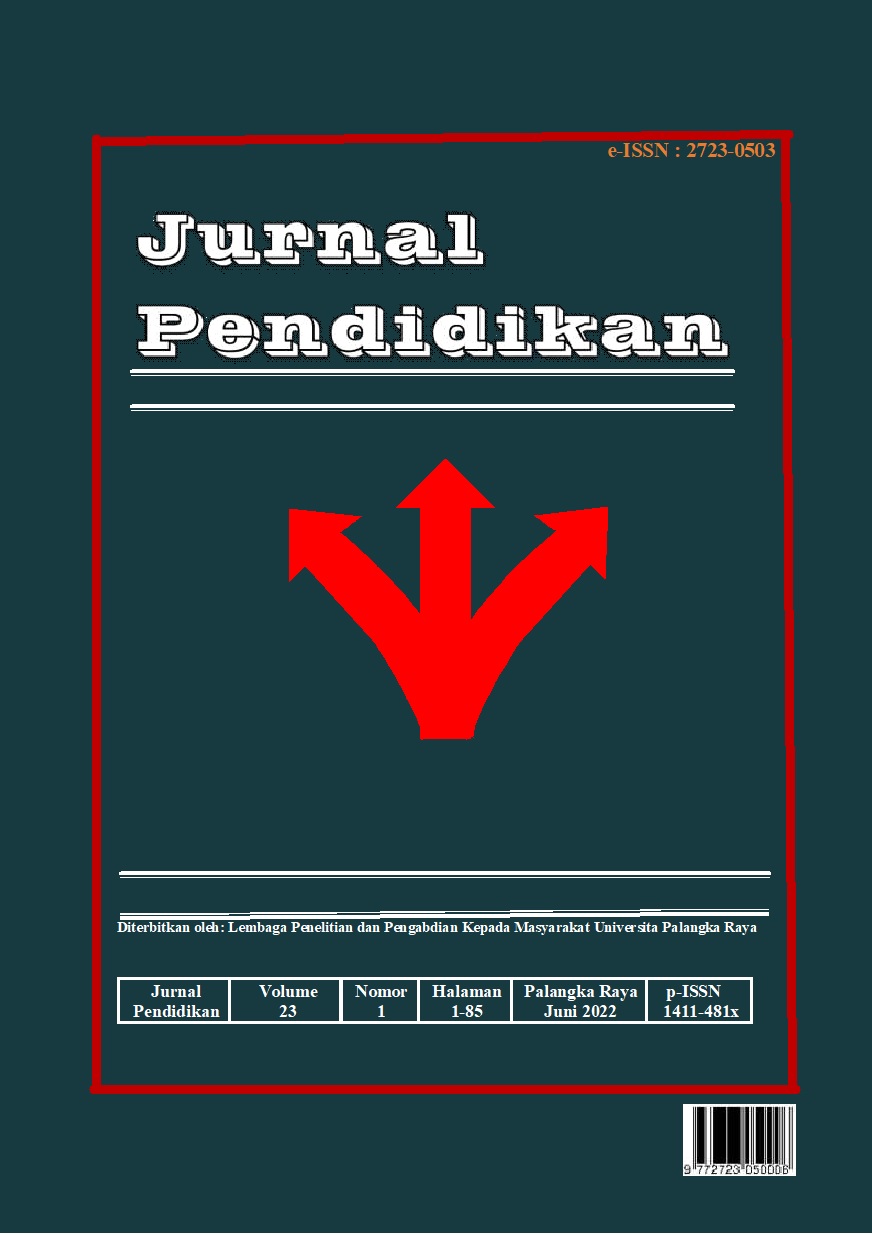ANALYSIS OF THE DIFFICULTIES OF CLASS X STUDENTS OF SMKN 4 PALANGKA RAYA IN SOLVING TRIGONOMETRY PROBLEMS
DOI:
https://doi.org/10.52850/jpn.v23i1.4667Kata Kunci:
Analysis, Difficulty, TrigonometryAbstrak
This research was motivated by the low scores obtained by students in the trigonometry material for the area of triangles in class X GP of SMK Negeri 4 Palangka Raya. In the 2019/2020 school year, only 48% of the 34 students achieved the school's Minimum Completeness Criteria, which is 65. The purpose of this study is to describe the difficulties experienced by students in solving math problems on trigonometry material and the factors that students experience difficulties. This research is a qualitative descriptive study. The results showed that the difficulties experienced by students in solving trigonometry problems were: (a) Difficulties in counting were difficulties in performing number operations. The factor that causes students to be less careful. (b) Difficulty in transferring knowledge, namely determining the formula and sine value. The reason is that students do not understand the material being taught so they cannot distinguish the formula used in determining the area of a triangle according to what is known in the problem. (c) Difficulty in understanding mathematical language, namely understanding mathematical symbols correctly. The reason is that students are less careful in writing down the numbers that match the existing mathematical symbols. (d) Difficulty in visual perception, namely making and understanding sketches or drawings based on existing problems. The reason is that students do not understand how to change what is asked in the question of the shape of a triangular image and vice versa.
Unduhan
Referensi
Annurahman. 2014. Belajar dan Pembelajaran. Bandung: Alfabet.
Arifin, Z. 2013. Penelitian Pendidikan (Metode dan Paradigma Baru). Bandung: PT Remaja Rosdakarya.
Corebima, A. D., dkk. 2015. The Contribution of Intelegence Quotient (IQ) on Biology Academic Achievementof Senior High School Student In Medan, Indonesia. International Journal of Educational Policy Research and Review, 2(10), 141 – 147.
Ghufron, Muhammad Nur. 2011. Teori-Teori Psikologi. Yogyakarta: Ar-Ruzz Media.
Hardianti, N. 2019. Identifikasi Kesulitan Siswa Dalam Menyelesaikan Soal Matematika Materi Trigonometri Kelas X IPA MA Muslimat Nu Palangka Raya. Skripsi tidak diterbitkan: Universitas Palangka Raya.
Jamaris, M. 2014. Kesulitan Belajar Presfektif, Asesmen, dan Penanggulangannya. Bogor: Ghalia Indonesia.
Kariadinata, R. 2013. Trigonometri Dasar. Bandung: CV. Pustaka Setia.
Marwanta. 2009. Mathematics for Senior High School. Jakarta: Erlangga.
Prastowo, Andi. 2012. Metode Penelitian Kualitatif dalam Perspektif Rancangan Penelitian. Yogyakarta : Ar-Ruzz Media.
Sidabutar, R. 2018. Hasil Belajar Matematika Siswa Ditinjau dari Kebiasaan Belajar dan Lingkungan Belajar. Diunduh pada tanggal 15 Maret 2021 dari http://e-journal.upr.ac.id/index.php/JPN/article/download/913/738.
Sinulingga, L. 2020. Upaya Meningkatkan Kemampuan Mengidentifikasi Informasi dari Teks Eksplanasi dengan Pemberian Tugas yang disertai dengan Penghargaan di Kelas VII.5 SMP Negeri 11 Binjai. Diunduh pada tanggal 8 Februari 2021, dari https://www.maxmanroe.com/vid/umum/pengertian-identifikasi.html.
Slameto. 2010. Belajar dan Faktor-Faktor yang Mempengaruhinya, Jakarta : PT. Rineka Cipta
Soedjadi, R. 1993. Simplifikasi Beberapa Konsep Dalam Matematika Untuk Matematika Sekolah serta Dampaknya (suatu analisis komparatif). Surabaya: Laporan Penelitian. Pascasarjana.
Soedjadi. 2000. Kiat Pendidikan Matematika di Indonesia. Jakarta: Direktorat Jendral Pendidikan Tinggi Departemen Pendidikan Nasional.
Sugiyono. 2018. Metode Penelitian Kuantitatif, Kualitatif dan R&D. Bandung: PT Alfabet.
Susanto, D. 2017. Identifikasi Kesalahan Siswa Dalam Menyelesaikan Soal Trigonometri Kelas X IPA-3 SMA Negeri 5 Palangka Raya. Skripsi tidak diterbitkan: Universitas Palangka Raya
Sutama. 2011. Penelitian Tindakan Teori dan Praktek dalam PTK, PTS, dan PTBK. Surakarta: Surya Offset
Unduhan
Diterbitkan
Cara Mengutip
Terbitan
Bagian
Lisensi
Hak Cipta (c) 2022 Desti Haryani, Ardo Subagjo, Muhamad Hamdani, Qodri Ali Hasan, Novie Widyanti

Artikel ini berlisensi Creative Commons Attribution-NonCommercial-NoDerivatives 4.0 International License.





